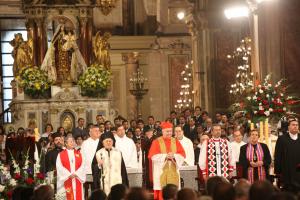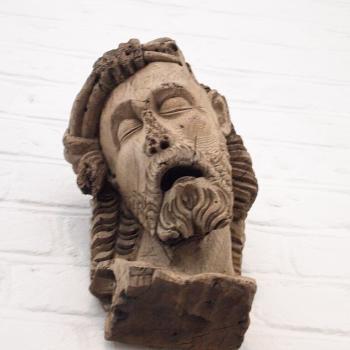
From the very beginning of Christian history, there have been conflicts and divisions among Christians. Even Jesus’ disciples were known to fight amongst each other as they sought special honors from him. It is the sad fact of history: Christians have not always been and are not currently united with the bond of love which Jesus said they should have. Jesus knew that would be the case, and yet he also knew that many Christians would seek to bring an end to those conflicts so as to help Christians unite with each other. He knew there would be those who would promote ecumenism and with it seek to have Christians be as they should be, bound together in one community of love. He knew this, and showed that he was with them, for this was, after all, what he prayed for as well (cf. Jn. 17:21).
Just as conflict and schisms have been with the church from the beginning, so, likewise, ecumenism has always had a role in the church. There has always been those who try to bring peace among Christians so that they can come together and worship God in a bond of love. Doing so, they did not dismiss the differences among the Christians; instead, the pointed out those differences are less real than the unity they have through their baptism and incorporation into Christ. Paul, who certainly held particular views of his own, understood the faith was not about him and his particular theological understandings, not about those whom he debated, but about Christ. He indicated that Christians should strive to center themselves on Christ, and not their conflicts, so that in and through Christ, they can be as they should be one.
Paul was not perfect in building up such peace; he got into fights even with his companions, which is why they would often go their separate ways from him. Nonetheless Paul knew that Christians could come together as one even in their diversity, that their diverse opinions and practices did not have to get in the way of unity. He set the stage for future ecumenism as he argued against those who promoted strict legalistic adherence to various Mosaic laws and practices as he pointed out their relative, and not absolute, value.. It was not that he disagreed with the practices of the legalists as much as he disagreed with the way they absolutized their way, thinking that all, even Gentile converts, would be expected to follow what was meant for the People of Israel. Paul said that Gentiles, who were not under the Law of Moses, should be accepted as Christians, and that their own practices and traditions would differ from their Jewish brethren because they were not expected to follow all the dictates of the Mosaic Covenant. Nonetheless, it is clear, Paul believed God’s revelation through Moses was greater than that which was found in the Gentile traditions and so his relativizing the Law of Moses was not meant to detract from its glory.
Sadly, many Christians believe there is something wrong with ecumenism. This is because they think it implies some sort of indifference to the truths of the faith. Was Paul indifferent? No; his ecumenism was guided by his theology and what he had learned and experienced once he believed in Christ. Paul affirmed Christ, as Christ was at the center of his theology. It was because his theology was solid that he could be ecumenical and work to overcome barriers forming within the church of his day. It is the same with many, if not most, of those involved with ecumenism today. It is not that they deny the faith, or think little of their own theological heritage; rather, they take it seriously, and know that they must find a way for Christians to live out the dictates of Christ, dictates which say Christians should love one another and be made as one through that love. How can any Christian not yearn for such union? Even if they disagree with each other and cannot find the way to bring about ecclesial reunion, they should still work with each other and build up love for each other. That way they will get to better know each other, they will begin to see they hold much in common and are not as different from each other as they once thought.

It is this great love for fellow Christians, and with it a desire for Christian unity, which we find at the heart of Venerable Felix Maria Ghebreamlak’s mission in life. Born in 1895 in the village of Giufa (in present day Eritrea), he entered seminary at the age of twelve, and was ordained a priest in 1918. He loved his homeland, and he wished for unity between the Ethiopian Orthodox and the Catholics. He came to believe that the way to encourage such unity was through monastic dialogue. This was because he understood the value of monastic spirituality within the Ethiopian Orthodox tradition. He saw in it a place of contact between the Ethiopian Orthodox, Eastern Orthodox, and Catholics. Thus, he desired to promote a Catholic monastic revival in Ethiopia and through it, set up the bridge which could be used to bring Ethiopian Christians together. In 1925, he was sent to Rome to serve as a confessor for the seminarians at the Ethiopian college. While there, he learned more about the Benedictine tradition and decided his Ethiopian project would best be served by becoming a Benedictine monk. He believed once he was a fully established Benedictine monk, he would be able to set up a Benedictine monastery in his homeland and use it to help promote ecumenism in Ethiopia. Eventually, he became a novice at Casamari Abbey in the Province of Frosinone, Lazio, Italy; they accepted him in 1930, knowing and approving of his desire. Other Ethiopian Catholics, agreeing with him and his mission, joined the monastery with him. In 1933 he was diagnosed with tuberculosis; because of it, he was allowed to say his final monastic vows early, on April 4 1934, only to die on June 8th of that same year. After his death, his desire, his project lived on, and many Ethiopians followed his example, becoming monks at Casamari Abbey only to later make their vows and go back to Ethiopia and establish Benedictine monasteries there. He was recognized as living a heroic life by St John Paul II on March 24, 1992, and he is currently under investigation for full canonization.
It was Venerable Felix Maria Ghebreamlak’s desire for Christian unity which was central to his mission in the world. It was his wish that Christians would manifest the love of Christ to each other instead of fight against each other which led him to monasticism; he saw within it what so many others can and do see – how monastic spirituality at its foundation guides and directs Christians to respect each other, to work for the benefit of each other, indeed to be hospitable to each other. And it is understandable how this led him to the Benedictine tradition for when the Benedictine virtue of hospitality is embraced, it becomes difficult for division to hold sway.
While most Christians are not called to a monastic life, they can still find their own way to work together. They should desire to be one with those Christians who are outside their own ecclesial tradition. They should realize the more they work together, the more they learn about each other, the more division can be overcome. The more they can love each other the more they will find the Holy Spirit will bring them together so that what separates them from each other will be less and unless, until, at last, they might indeed fulfill Jesus’ desires and be one. Ecumenism is a holy goal, and many Christians who have sought it out have found it has transformed them, making them holy saints. Those who fight against it, those who contend against it, need to reconsider and ponder why they are against it if it bears such holy fruit. Do they really serve Christ by continuing to foster division, or is it someone else they are serving?
Stay in touch! Like A Little Bit of Nothing on Facebook.
If you liked what you read, please consider sharing it with your friends and family!













